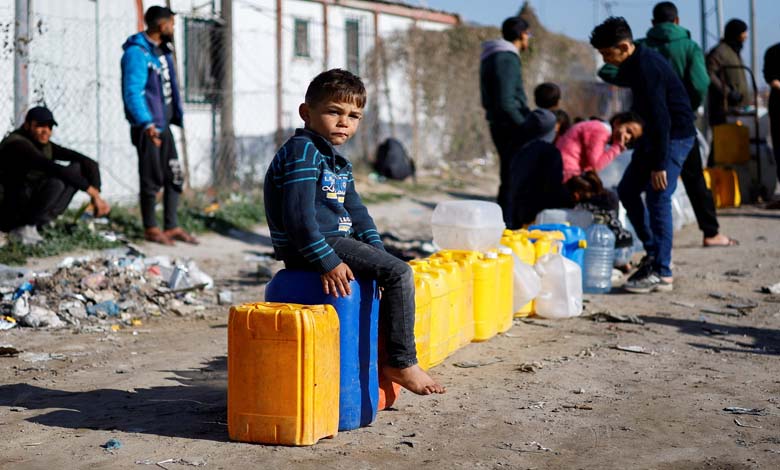Thirst Deepens the Suffering of Gaza’s Residents

Many Gaza residents wait for hours in long water queues, often marked by crowding and altercations.
Driven by hunger, they cross destroyed neighborhoods daily to fetch drinking and hygiene water, a physically demanding task that barely secures the bare minimum to maintain basic health.
-
Signed by Over 100 Journalists: International Petition to Break Gaza War Blackout
-
Diaries of a Gaza family: waking up hungry and sleeping on broken hope
While global attention is focused on the food crisis in Gaza — where the Integrated Food Security Phase Classification (IPC) warns of an unfolding famine due to Israel’s 22-month-long war — humanitarian agencies say the water crisis is equally severe.
Some water is sourced from small desalination units operated by aid agencies, but most is drawn from a highly saline aquifer increasingly polluted by sewage and chemicals leaking from rubble. This has led to rising cases of diarrhea and hepatitis.
Israel’s Coordinator of Government Activities in the Territories (COGAT) claims to operate two pipelines supplying millions of liters of water daily to Gaza. However, Palestinian water officials report that the pipelines are no longer functional.
-
Hungry in Gaza: When Chaos Devours the Loaf of Life
-
Netanyahu Considering Gaza Annexation or Encirclement if Truce Talks Fail
Israel cut off water and electricity supplies at the start of the conflict. Though some supplies have resumed, major damage has been inflicted on the water infrastructure.
Most of Gaza’s water and sanitation systems are destroyed. Groundwater pumps, which rely on small generators, often sit idle due to a severe fuel shortage.
COGAT states it has permitted the entry of water infrastructure maintenance equipment throughout the conflict in coordination with aid agencies.
-
Gaza’s Humanitarian Crisis Shifts Western Diplomacy Toward Recognizing Palestine
-
Worst-case famine scenario: UN report warns of humanitarian catastrophe in Gaza
Moaz Mukhaymar, a 23-year-old former university student, says he walks nearly a kilometer and waits two hours to fill water containers — often repeating this task three times a day. He hauls the water back to his family’s tent on a metal cart across rough terrain.
He describes a major crisis, noting that sweet (clean) water and salty water are both in short supply. Water, he says, is the most urgent need for the people. Each day, they make at least two or three trips to fill jugs just to make it through.
His 53-year-old mother says her son brings water for their extended family of 22, who live in a cluster of tents in Deir al-Balah, central Gaza. Pointing to empty barrels, she says they can barely manage to collect enough clean water for drinking.
-
Netanyahu Caught in the Military Trap over Gaza: Generals Rebel, Soldiers Absent
-
What Is the Fate of the Gaza Truce? Hamas Responds to Witkoff
Long queues in scorching heat are common throughout Gaza, with tensions rising as people compete for access. Fights sometimes break out.
Most people live in makeshift shelters with no sewage or sanitation, lacking sufficient water to drink, cook, or clean. Disease is spreading as a result.
The UN sets the emergency minimum water consumption at 15 liters per person per day for drinking, cooking, and hygiene. By contrast, average consumption in Israel is about 247 liters daily. In Gaza, Oxfam reports current usage ranges from three to five liters.
-
A Break in Khan Younis Gets Elite Israeli Unit Pulled from Gaza
-
Gaza Truce : Just 200 Meters Separate Israel and Hamas
Oxfam recently stated that preventable waterborne diseases are “spreading across Gaza,” with reported cases increasing by around 150% over the past three months.
Israel blames Hamas for the suffering in Gaza and claims it allows adequate aid into the enclave, which is home to 2.3 million people.
Danish Malik, global water and sanitation lead at the Norwegian Refugee Council, notes that water scarcity is worsening daily, forcing people to choose between drinking and washing.
-
From Displacement Camps to UN Facilities: In Gaza, No One Is Spared
-
UN warns of suffocating Deir al-Balah in Gaza… the last lifeline
Collecting water often falls to children, while parents search for food or essentials. Munther Salem, Director General of Water Resources in Gaza, says children have lost their childhood, becoming water carriers chasing tankers or walking long distances to collect water for their families.
With clean water hard to come by, many residents near the coast now bathe in the sea. A new water pipeline funded by the UAE aims to supply 600,000 people in southern Gaza from a desalination plant in Egypt, though it may take weeks to complete.
-
Largest Emirati Aid Ship Heads to Gaza to Save Thousands from Hunger
-
“I pretended to be dead to survive”: How Gaza’s breadlines turned into graveyards
Aid agencies say much more must be done. UNICEF spokesperson James Elder warns that prolonged deprivation is now fatal. Hunger and thirst, he says, are no longer consequences of war — they are its direct outcomes.
Bouchra El-Khaldi of Oxfam stresses that a ceasefire and unrestricted humanitarian access are essential to resolve the crisis. Otherwise, she says, we will continue to witness people dying of preventable diseases in Gaza — which is already happening before our eyes.












